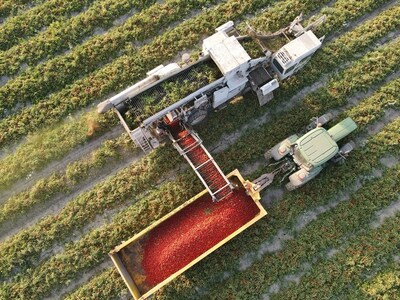SaliCrop's Novel Seed Enhancement Tech Makes Deserts Bloom
Comunicato Precedente

Comunicato Successivo

Leveraging its expertise in desert technology, the company developed a novel, non-GMO approach to bolster seeds' resilience to abiotic stresses brought on by extreme climate challenges. SaliCrop's solution can help boost crop cultivation in arid regions, raising yields and elevating the value to marginal lands, turning them into arable stretches more fit for growing food. The result is greater food security for the future.
SaliCrop's benefits already are taking root in Spain's tomato industry. Saline soil and heat stress are considered the worst abiotic stressors. Dry soil with excessive salt content hinders the germination and growth potential of numerous crops. Soil salinity is largely attributed to rising sea levels which leads to seawater intrusion in coastal areas and the weathering of rock. This is exacerbated by irrigation with brackish water which for many farmers is unavoidable.
Heat stress will threaten nearly three-quarters of the world's food production over the next 20 years, according to a late 2022 report by research group Verisk Maplecroft. "The greatest concerns occupying farmers today is how to maintain yields in the face of volatile and harsh climate conditions which lead to poor soil quality," explains Sharon Devir, Ph.D., co-founder and Active Chairperson of SaliCrop. "More than 830 million hectares of agricultural land is now salty. Abiotic stresses are responsible for 30-50% loss of agricultural productivity worldwide. This amounts to a colossal USD170 billion in revenue losses yearly. Our solution centered on countering this by helping farmers who grow crops in vast open fields."
Sowing the seeds of abundance
SaliCrop's proprietary seed enhancement technology is the brainchild of Ṛcā Godbole, Ph.D., co-founder and CSO of SaliCrop. Godbole is a plant biologist who hails from a dynasty of agronomists. She dedicated time assisting smallholder farmers in coastal regions of Mumbai contending with substantial soil salinity setbacks in efforts to grow crops such as rice and beetroot. Godbole and Devir, a mechanical agronomist who established the first Arab-Israeli life science technology greenhouse in Nazareth, Israel, began conducting trials in Israel growing wheat and vegetables using saltwater irrigation in a closed facility.
SaliCrop's has developed hundreds of seed enhancement protocols designed to improve plant resilience to the impacts of climate change by intentionally exposing the seeds to controlled abiotic stressors. This process harnesses the innate stress-response mechanisms helping them thrive even during periods of intense heat, prolonged dry spells, and low water.
"Plants have certain environmental stress inducible genes that act as internal alarms," explains Godbole. "When there is too much salt, or too much heat, these alarms go off and the plant enters defense mode. But often, by the time the plant reacts, it's too late." Without changing the plant's DNA, SaliCrop's green solution acts as a gentle nudge to preemptively stimulate the stress responses even before the plant finds itself in salty or hot conditions.
"Under SaliCrop's treatment, plants not only thrive in poor quality, highly saline soil through enhanced nutrient absorption and improved root structures, but they also exhibit increased vigor and superior germination rates," affirms Carmit Oron, CEO of SaliCrop. "This innovation turns marginal lands, previously considered barren, into fertile grounds capable of abundant food production. As climate change intensifies, farmers globally are in urgent need of sustainable solutions to adapt and succeed. SaliCrop is at the forefront, with leading agricultural players already integrating our technology," Oron adds.
The tomato success story
The SaliCrop solution is bearing fruit in tomato cultivation in multiple locations, including Spain, which has been experiencing seasonal temperature highs reaching 45°C. Two years ago, the start-up entered collaboration with farmers in Extremadura in projects to boost the yields and quality of tomatoes grown in 30-hectare sized fields.
Spain is increasingly experiencing droughts, raising concerns about water scarcity. In fact, Spain could be experiencing its worst drought conditions in the last 160 years of records. Reservoir capacity has plummeted to 30% of its total; its lowest in 27 years according to the Ministry for Ecological Transition. "This results in a loss of soil moisture causing tomato crops to shrivel and is compounded by losses in yields," explains Godbole. "The water loss leads to salt accumulation around the roots, hindering water absorption."
"Our climate-smart seed enhancement technology has empowered tomatoes to better withstand extreme climate events," adds Devir. "Through extensive field trials, with the leading commercial seed varieties, we've observed promising outcomes, including substantial enhancements in plant growth with an impressive 10-17% increase in yield. Additionally, post-harvest Brix levels have improved. This translates to an added income of approximately 1,300-1,800EUR per hectare for the farmers."
Going commercial
While the company is progressing with field trials across Europe, Africa, and India, focusing on a open field variety of crops including onions, broccoli, chili rice, and more. SaliCrop is already at commercial stages in Israel, actively selling treated tomato seeds across 700 hectares.

As SaliCrop enters commercial stages, its treated seeds are making a difference across over 1,000 hectares in Israel and beyond. The company is advancing its field trials across Europe, Africa, and India, targeting a variety of crops and demonstrating the universal applicability of its solution.
CEO
SaliCrop Ltd
Email: [email protected]
Web: www.salicrop.com
Liat Simha
Tel: +972-9-9742893
E-mail: [email protected]
Web: www.nutripr.com
Twitter: @NutriPR_
Photo: https://mma.prnewswire.com/media/2339423/Salicrop_tomato_cultivation.jpg
![]() View original content:https://www.prnewswire.co.uk/news-releases/salicrops-novel-seed-enhancement-tech-makes-deserts-bloom-302060424.html
View original content:https://www.prnewswire.co.uk/news-releases/salicrops-novel-seed-enhancement-tech-makes-deserts-bloom-302060424.html

Ufficio Stampa
PR Newswire (Leggi tutti i comunicati)
209 - 215 Blackfriars Road
LONDON United Kingdom




